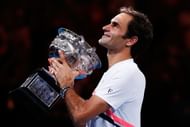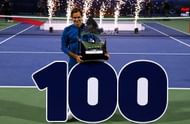Roger Federer, in his beautiful journey towards becoming the greatest ever to play the game of tennis, has had multiple phases. When he first crashed onto the scene and started upsetting the big guns of the time, he was a fierce character. His emotions and reactions made his aggression quite visible to the audience.
After a tragic personal loss, the death of his coach Peter Carter, and with growing age and experience at the pro level, a switch turned in Federer. He became the calm, non-sweating genius we know.
Federer rocked the circuit and won almost everything there was to win, without showing any overt emotions on the court.
The Swiss dominated the scene from mid 2000s till the early 2010s. His lean patch began in the middle of the last decade, when people started writing him off because of his age.
As the miles piled up on his body, the injuries started mounting too. This, however, wasn’t the end of the fairytale.
Federer's resurgence began in 2017, when he became the oldest man in Open era to win Wimbledon - thus taking his Grand Slam tally to a flabbergasting 19. In these years Federer tactically missed the French Open, as he tried to preserve his body for events where he had a better chance of winning.
Federer displayed his fluent, easy on the eye, versatile yet powerful game throughout the season. He won his 20th Grand Slam in 2018, which was the Australian Open.

After his renaissance, there was another change in Federer’s attitude towards the game. He played with more freedom. Now, along with being a stern competitor, he was also focusing on enjoying his time more, rather than merely fighting to inscribe his name in the history books.
Federer proved with his comeback that to write him off at any stage would be a mistake. His fitness levels are still immaculate; his gameplay is still thoroughly impressive; he knows the formula of performing well at the grandest stage. Most importantly, he has a happy knack of disproving his critics.
After missing the French Open for two consecutive seasons, Federer decided to participate in 2019 - only to lose in the semifinals against his arch-rival, Rafael Nadal. But clay has been Federer's Achilles' heel for a long time, and reaching the semifinals is by no means an underachievement.
At Wimbledon, Federer fell just short of the mega prize. However, his loss to Novak Djokovic in a five-setter that ended with a tiebreaker (under the new rules) is evidence enough that he has still got what it takes.
The final will go down as one of the greatest Wimbledon finals ever, where there was no way to separate the two champions. The match had to end though and we needed to have a winner, which is the only reason why it did end.
Federer closed out the Grand Slam season by succumbing to Grigor Dimitrov in the US Open quarterfinals - another five-set battle.
Federer did fairly well at the Masters tournaments in 2019, winning Miami and finishing as the runner-up in Indian Wells. He made the quarterfinals in three of the other four he played, losing early at Cincinnati.
Barring the Australian Open, the early hardcourt season was quite profitable for Federer. He defeated the top guns of the game like Stefanos Tsitsipas and Stan Wawrinka among others, while being crowned champion at the Dubai Tennis Championships (for his 100th title). In the latter half of the year, Federer also won the Swiss Indoors tournament.

Federer's display in the grasscourt season, his favorite part of the year, was fantastic. Before his dominant performance at Wimbledon, he won the only grasscourt ATP Masters tournament in which he featured - the Halle Open in Germany.
The claycourt season, which is often the toughest for him, continued to remain so. He lost to Dominic Thiem at the Madrid Open and had to withdraw from the Italian Open after reaching the quarters.
Over the previous few seasons Federer had strategically opted out of the claycourt season to take the necessary rest to keep his body refreshed, but in 2019 he decided against that. Considering he managed his schedule just fine even with the changed approach, it shouldn't be a surprise if, in the upcoming season, Federer again decides to play on clay.
The Swiss ended the season with an 84.1% win rate, which is higher than what managed in the previous season. He won 53 out of the 63 matches that he played, and his year-end ranking was No. 3.
If any other player outside the Big 3 had had such a season, it would have been considered a great success. However, the unrealistically high standards that the tag of Roger Federer brings along with it, often makes us second-guess his achievements. It is time we look beyond that and come back to the reality of the sport.
Federer has assured his fans that he plans to continue playing at least until Wimbledon. He has already defied the norms of age and proven that he can (still) stand toe to toe with his younger counterparts. He has been able to defeat his long-term rivals and even the younger, newer players who are doing well at the highest level, and he continues to remain entrenched in the top 10.
Even if one keeps the stats of the previous season aside and just looks at the way he plays, the shape he is in, his godly talent and his wizardry over the game, then it wouldn’t be advisable to bet against him winning another Grand Slam.
Federer has confirmed that he will be playing at the Australian Open and at Wimbledon, two tournaments and surfaces over which he has gained mastery. There is no real reason for the tennis world to not expect Federer to have another season of top-tier play, and further advance his legacy.
Who Are Roger Federer's Kids? Know All About Federer's Twins
